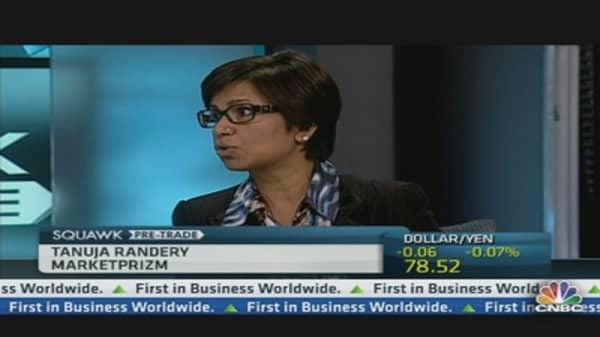Electronic glitches are simply a fact of life in modern fragmented markets and human error, not technology, is to blame for multibillion-dollar trading errors, Tanuja Randery, chief executive of MarketPrizm, told CNBC on Monday.
“Electronic trading has been really beneficial to the markets, I believe,” Randery told CNBC’s “Squawk Box Europe,” “[It has] helped with the costs [of trading]. It has increased transparency and actually with all the discussion around abuse of the markets I think it becomes easier with electronic markets, to detect those.”
High-frequency trading (HFT), which uses software to post trades in microseconds, has been blamed for a number of high-profile trading glitches on global stock markets over recent months.
The incidents include a glitch at U.S. broker Knight Capital Group which ran up a $440 million loss in 45 minutes after a bug in the automation process generated thousands of mistaken orders for stocks.
The latest glitch believed to involve HFT occurred on Friday, when nearly $60 billion was temporarily wiped from India’s National Stock Exchange. After a brokerage placed 59 erroneous orders the main share index plunged 16 percent before rallying, causing critics to question the safety of electronic trading.
Randery, whose firm MarketPrizm provides trading infrastructure services to firms, told CNBC that these glitches were not the fault of the technology itself, but were human errors.
“The issues of glitches that we’re facing today, for example on the Indian stock exchange … or even the Knight Capital [glitch] have been caused by less pre-trade risk checks, less testing of algorithms in the market. I think people are acting on submitting orders before checking.”
As questions are raised over whether the practice of HFT should be regulated, Randery told CNBC that there should be less focus on the ramifications of trading at high speed and more on risk checks and compliance before the trades take place.
“Focusing on the electronic side of things is the problem, there are some basic 101 things that the regulators need to focus on [such as compliance],” Randery said. “Firms will always find ways to get around regulations [on speed trading]. In fact, I believe that curbing speed will create significantly more inefficiency and investors will suffer.”
HFT has also been accused of pulling liquidity from the markets, but Randery disagreed, saying that all types of funds and trading strategies used algorithms. “It provides liquidity into the market,” she added.
Roger Nightingale, economist at RDN Associates, agreed that electronic trading was not to blame for glitches. These were, he said, due to the economic crisis.
“In an economic crisis, there are bound to be glitches,” he said. “The glitches at the moment are not so much the function of the [trading] infrastructure but the disastrous economy.”
Nightingale disagreed with Tanuja Randery that compliance could help solve the problem of glitches.
“Where I do disagree on is compliance. Compliance and regulators have never helped to solve any problem in the universe,” he said. “We need a police system that looks for misbehavior. …You don’t try and prevent the problem before it occurs, you correct it after it occurs.”
—By CNBC.com’s Holly Ellyatt




